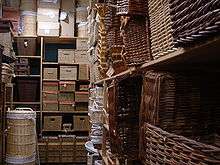Hamper
A hamper refers to one of several related basket-like items.[1] In primarily British usage, it refers to a wicker basket, usually large, that is used for the transport of items, often food. In North America, the term generally refers to a household receptacle, often a basket, for clean (out of the dryer or off the line) or dirty clothing, regardless of its composition, i.e. "a laundry hamper". Typically a laundry hamper is used for storage and will be sturdier, taller and have a lid while a laundry basket is open and used mainly for transport.

In agricultural use, a hamper is a wide-mouthed container of basketwork that may often be carried on the back during the harvesting of fruit or vegetables by hand by workers in the field. The contents of the hamper may be decanted regularly into larger containers or a cart, wagon, or truck.
The open ventilation and the sturdiness offered by a hamper has made it suitable for the transport of food, hence the use of the picnic hamper.
At one time it was common for laundry services to leave a large basketwork container with a lid which is now commonly referred to as a clothes hamper. The same type of container would be used to return clean clothing, which would be put away by the laundry service and the empty container left in place of the full container for later pickup. This type of daily or bi-daily hamper service was most common with Chinese laundry services in 19th-century England and America.
Charitable hamper
There is a long tradition of community and social philanthropy and charity related to hampers, in which persons or community groups donate to needy people a hamper of food, clothing, toiletries, cleaning products, or other household necessities, to assist with their family economy.
Up until the mid 20th century, in the Western tradition, the hamper was a basket that could be carried by the donor and physically handed to the recipient. This limited the size of the gift to food ingredients for at most several days, or other necessities for one to two weeks. The basket itself was a useful item around the house or farm, and any cloth wrapping for the food or lining of the basket would also be usable by the recipient family.
In more recent times, the hamper would likely be a plastic bag or acrylic fibre bag of a size that can be carried, with tinned or packaged goods. A Christmas hamper is likely to be bigger and have some party or celebratory foods, or toys. Hampers can also contain related festive foods.
Christmas hamper
A Christmas hamper is a traditional gift containing small nonperishable food items, particularly seasonal favorites such as fruitcake or plum pudding, chocolate, nuts, jams, biscuits, honey, smoked or dried meats, and cheese. Some hampers containing tea, coffee, or cocoa might also include a cup and saucer, often seasonally themed or personalized. Luxury hampers may also contain high-end items such as tins of caviar or small bottles of wine. A "fresh hamper" contains perishable items such as fruits, baked goods, or flowers. The tradition of the Christmas hamper may be intended as a special holiday meal for people who might otherwise have no memorable meal to mark the occasion, or for people such as students or shut-ins who are unable to join their families for Christmas.
In the US, the Christmas hamper is more usually called a gift basket and does not necessarily contain food items. Non-food gift baskets are frequently themed, such as baskets containing luxury bath items including scented soaps and towels, or beauty baskets with skincare products, perfumes, or lotions. These gift baskets are also popular for occasions other than Christmas.
Commercial hampers
A number of companies sell ready-made food hampers or provide customised hampers, which may involve sourcing specific items. Such hampers are popular gift items in the UK and Ireland. Hamper companies usually link their services to certain occasions, most particularly Christmas. Grocers, delis and supermarkets may also stock ready-made hampers, though mostly just on a seasonal basis, and with a selection generally limited to items stocked by the store or sourced from their own suppliers. In the case of large grocery chains this may be a substantial selection.
Recently dietary hamper companies have sprung up catering to customers with diabetes or those intolerant to foods such as gluten, providing a selection of food which is suitable.
See also
References
- "Hamper". Merriam-Webster Dictionary. Merriam-Webster. Retrieved 17 January 2014.